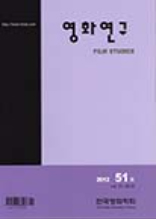- 영문명
- The Landscape and Critique of Everyday Reality and Innovation in Filmmaking: Czechoslovak Cinema(1963-1968)
- 발행기관
- 한국영화학회
- 저자명
- 정태수
- 간행물 정보
- 『영화연구』제50호, 467~506쪽, 전체 40쪽
- 주제분류
- 예술체육 > 예술일반
- 파일형태
- 발행일자
- 2011.12.31
7,600원
구매일시로부터 72시간 이내에 다운로드 가능합니다.
이 학술논문 정보는 (주)교보문고와 각 발행기관 사이에 저작물 이용 계약이 체결된 것으로, 교보문고를 통해 제공되고 있습니다.

국문 초록
영문 초록
This paper explores the Czechoslovakian films from 1963 to 1968, which I call the “innovation of Czechoslovakian cinema” in that they were original and creative. What became the bases for the Czechoslovakian cinema innovation were the political, cultural, and artistic values that emerged in the establishment of “The Socialism with a Human Face.” Among others, what was at the centre of these values was to escape from the existing socialist realism. One thing that became a symbolic, significant beginning point of this work of escaping was the reexamination of Kafka’s work as not being capitalist and decadent. This became a way of overcoming the socialist realism that had not allowed any approach towards everyday realities as well as a cause for the (re)discovery of the Czechoslovakian avant-garde culture and its application into present matters. As a result of them, as this paper will argues, the two key words of “everyday reality” and “avant-garde” came to characterize the Czechoslovakian films of this period. First, the exploration of everyday realities was mainly found in the works of Miloš Forman and Vĕra Chytiloá. This paper shows that their representations of everyday realities not only includes Czechoslovakia’s political and social realities, but also reveals various aspects that were so invisible that they only can be seen throughout laugh and satire and irony. In addition to this, this realist representation of everyday life played an important role in showing the ways in which various, refracted relations both between individuals and between individuals and society in the history of Czechoslovakia, such as anxiety and tension, were caused and exploring how the real and ideal meet together. Second, the paper argues that the reevaluation of Kafka that brought back the tradition of the Czechoslovakian avant-garde culture of the 1920 had a significant impact on the works of Chytilová and Jan Nĕmec; especially, the stream of consciousness, independence of the screen, and destruction of narrative that frequently appeared in their films played an important role in shaping the “innovation of Czechoslovakian cinema”.
목차
1. 개혁의 시기에서 인간의 얼굴을 한 사회주의로
2. 문학적 토대와 영화
3. 일상적 현실과 창작수법에 대한 새로운 실험
4. 결론
키워드
해당간행물 수록 논문
- 일제 강점 말기와 유신 정권 시기의 국책선전영화 비교 연구
- 유신체제기 한국영화 <증언>(1974)의 영화적 특징과 시대적 특수성
- 조선영화 태동기의 일꾼 이구영의 영화인생론
- 쇼트/역쇼트에 대한 지각심리학적 접근
- 영화제작에 사용되는 모션과 페이셜 캡쳐 연구
- 열린 아시아, 닫힌 민족주의
- 리아 타지리의 영화 <역사와 기억>에 대한 연구
- 일상적 현실에 대한 풍자와 비판, 창작수법의 혁신, 체코슬로바키아 영화(1963-1968)
- 인터랙티브 알고리즘에 기반을 둔 다양한 영상 실험과 미학
- 부산영상산업 발전방향 타당성 연구
- ‘한국영화 르네상스’(1997~2006)의 동역학에 대한 연구
- 다큐멘터리영화의 관객소통 방식 연구
- 경북 영화산업 활성화 방안
- <잔 다르크의 열정>의 표현주의적 성격에 대하여
- 남자, 몸, 폭력 그리고 이산(離散)정체성의 정치학
- 대안적인 다큐멘터리 스타일: 장르 컨벤션의 활용
- 아리스토텔레스의 ‘시학’을 통해서 본 영화의 대중성 연구
- 관계론적 입장에서 바라본 탈 중심 공간의 시각이미지 표현 방법 연구
- <써니>를 통해 본 복고 이미지와 환각적 기호로서의 향수에 관한 연구
참고문헌
관련논문
예술체육 > 예술일반분야 BEST
- 생성형 AI 도구와 디자이너의 협업 프로세스 개발 - 이미지를 통한 아이디어 확산에서 고해상도 렌더링까지
- 영화 [올드보이]와 소포클레스 「오이디푸스 왕」의 상동성 연구
- ‘일과 삶의 균형(Work-Life Balance)’ 척도 개발을 위한 연구
최근 이용한 논문
교보eBook 첫 방문을 환영 합니다!

신규가입 혜택 지급이 완료 되었습니다.
바로 사용 가능한 교보e캐시 1,000원 (유효기간 7일)
지금 바로 교보eBook의 다양한 콘텐츠를 이용해 보세요!



